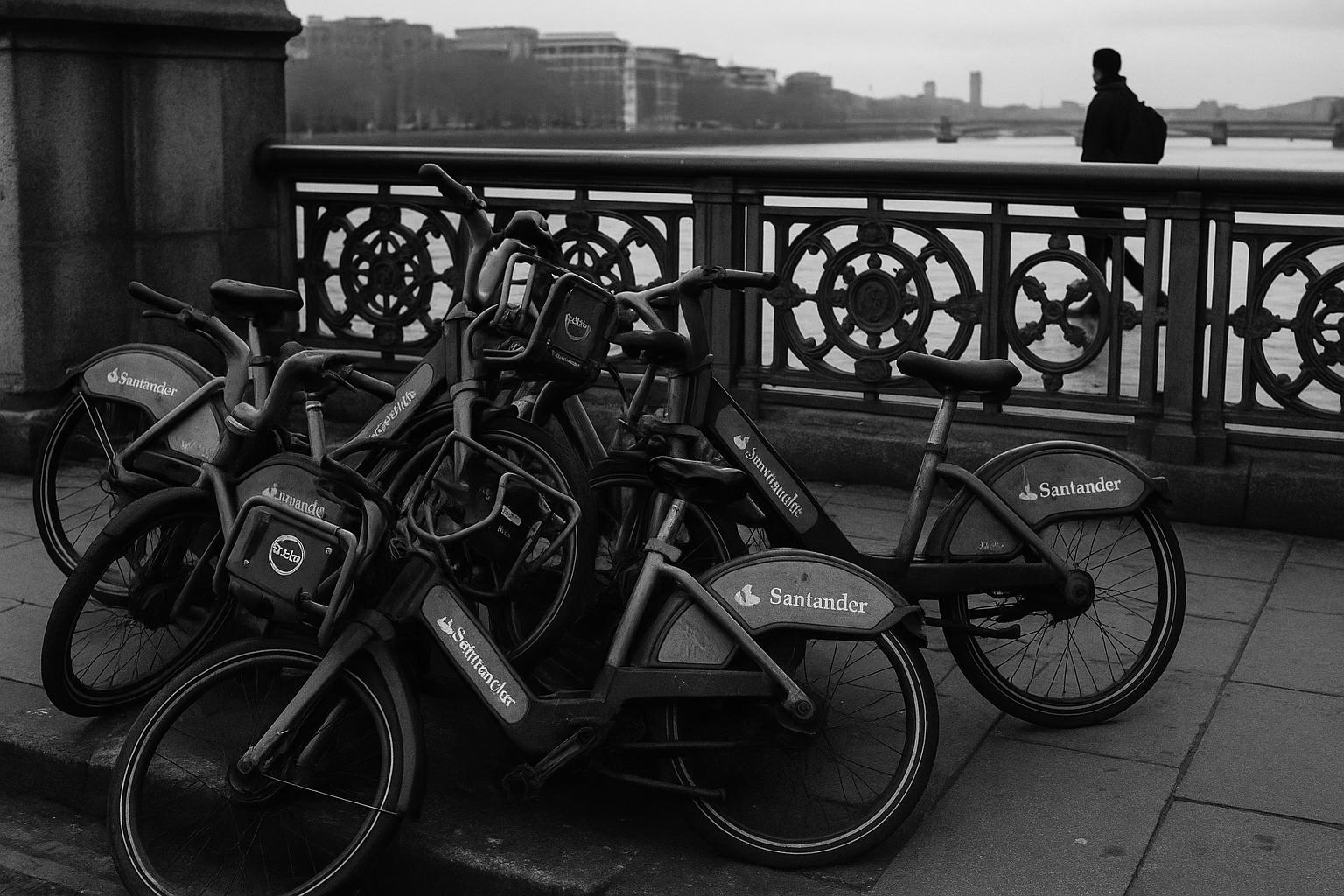Differing borough contracts and technical limits on motor assistance have left clusters of hire e‑bikes abandoned at west London bridge crossings, prompting calls for a pan‑London licensing approach to stop journeys being cut short at council boundaries.
Commuters and weekend cyclists using west London river crossings have been met with an unexpectedly bureaucratic sight: clusters of hire e‑bikes stranded at borough boundaries after neighbouring councils licensed different operators. The comic Dara Ó Briain likened the scenes to “Checkpoint Charlie”, arguing that the mismatched permissions have left electric bikes piling up where Hounslow meets Richmond. Reporters observed dozens of machines abandoned or dumped near the southern entrance to Chiswick Bridge, a vivid illustration of the practical consequences of the split approach. (In a post on X Mr Ó Briain said the differing borough licences had turned “every bridge” into a mini border crossing.)
The problem stems from Hounslow’s decision to award exclusive local contracts to Forest and Voi, while nearby Richmond upon Thames permits Lime to operate inside its boundary. As part of the local arrangements Lime agreed to a Hounslow request that its motor assistance cut out when a bike approaches the borough boundary — a technical measure that makes machines heavy to pedal and encourages riders to end trips at the edge rather than cycle across. Journalists and residents reported clusters of machines on opposite sides of bridges where one operator’s fleet is permitted and another’s is not.
Hounslow’s change of operator follows the end of a two‑year trial with Lime; the council’s new contracts with Forest and Voi began in mid‑August 2025. According to the council’s information, the review was prompted by resident complaints about pavement obstruction, concerns over perceived high hire costs and parking behaviour. Hounslow says it now operates a network of more than 250 designated parking bays and sets out clear routes for reporting mis‑parked or abandoned vehicles — including expectations that operators will relocate bikes and enforce user sanctions.
The companies involved have offered contrasting accounts and appeals for a joined‑up fix. Lime’s spokesperson described the situation as frustrating for riders and said many customers had contacted the firm disappointed by the “patchwork of boundaries”, urging councils to cooperate so journeys can be seamless. Forest’s head of policy argued the scenes show “exactly why we have been calling for a pan‑London approach to regulation”, while a Voi spokesperson stressed that users remain “free to cycle across borough boundaries”, subject to parking rules in participating areas. These statements reflect operators’ broader case that shared e‑bikes can shift journeys out of cars and support sustainable travel — a point made in their public comments, but one that critics say is undermined when local rules conflict.
Campaigners and sector bodies have joined calls for a single, strategic framework. Richard Dilks, chief executive of shared‑mobility charity CoMoUK, called the episode “a rather bizarre set of circumstances” and warned it is an unfortunate by‑product of leaving scheme licensing to individual boroughs. He suggested that the government’s English Devolution and Community Empowerment Bill — currently progressing through Parliament — could enable Transport for London to take on licensing for rental e‑bikes, allowing a coherent, capital‑wide approach to be designed. CoMoUK has also urged greater dialogue between councils and operators, alongside designated parking and consistent enforcement, to prevent pavement obstruction while preserving the benefits of micromobility.
Transport for London and boroughs are already involved in policing abandoned and mis‑parked machines. TfL has taken action in the past on clusters of shared vehicles, and both Hounslow and Richmond publish practical guidance for residents on how to report problems. Richmond’s agreement with Lime sets out expectations for marked parking bays and local responses by operator staff, while Hounslow’s scheme documentation emphasises enforcement measures and routes for residents to raise concerns — laying out the practical levers councils are using to steer behaviour on the street.
The episode encapsulates a broader trade‑off in urban transport: hire e‑bikes bring the promise of cleaner, more active travel but require careful local management to avoid becoming a public nuisance. Operators, campaigners and councils all point to the need for a more consistent operating model. Until that is delivered — whether by voluntary borough cooperation or by the sort of city‑wide licensing some industry voices now call for — bridges like Chiswick provide a small but striking example of how mismatched policy can turn a benign technology into a civic headache.
 Reference Map:
Reference Map:
Reference Map:
- Paragraph 1 – [1], [3]
- Paragraph 2 – [1], [3], [4]
- Paragraph 3 – [4], [5]
- Paragraph 4 – [1], [3]
- Paragraph 5 – [1], [7]
- Paragraph 6 – [4], [5], [6]
- Paragraph 7 – [1], [7], [4]
Source: Noah Wire Services
- https://www.irishnews.com/news/uk/e-bike-licensing-means-every-bridge-is-checkpoint-charlie-comedian-says-M5PW3IFHIJOBNF25T6I57ZSR3M/ – Please view link – unable to able to access data
- https://www.irishnews.com/news/uk/e-bike-licensing-means-every-bridge-is-checkpoint-charlie-comedian-says-M5PW3IFHIJOBNF25T6I57ZSR3M/ – The Irish News reports that comedian Dara Ó Briain likened west London river crossings to ‘Checkpoint Charlie’ after contrasting borough decisions on e‑bike licensing caused clustering at bridges. The PA‑written piece notes Hounslow had appointed Forest and Voi while neighbouring Richmond permits Lime, producing a patchwork of operator boundaries. The story describes Lime e‑bikes’ electric motors cutting out on approach to Hounslow, making bikes hard to ride and prompting many trips to end; reporters saw about 30 bikes near Chiswick Bridge. Quotes from CoMoUK, Lime, Forest and Voi call for pan‑London coordination and better parking/enforcement.
- https://www.standard.co.uk/news/uk/hounslow-dara-o-briain-lime-forest-hounslow-council-b1243555.html – The Evening Standard covers Dara Ó Briain’s social‑media complaint that e‑bikes are “stacking up” at river crossings between Hounslow and Richmond because each borough has chosen different hire operators. The piece repeats that Hounslow has licensed Forest and Voi while Richmond licences Lime, and reports that Lime agreed to a Hounslow request causing its motor assist to cut out at the borough boundary, leaving bikes heavy to pedal and often abandoned. Journalists observed scores of bikes at the southern entrance to Chiswick Bridge. Operators and campaigners are quoted urging joined‑up borough working or a single London framework.
- https://feeds.bbci.co.uk/news/articles/cz93gdl42y8o – BBC News reports that Hounslow Council ended its two‑year trial with Lime and awarded exclusive e‑bike operation to rivals Forest and Voi, the new contracts commencing on 11 August 2025. The story explains the decision followed resident complaints about pavement obstruction, alleged high prices and parking behaviour, and notes Hounslow’s network of more than 250 designated parking bays. The article records operator and council comments, cites Transport for London action on abandoned bikes and places the change within a wider London debate about micromobility regulation and enforcement across boroughs.
- https://www.hounslow.gov.uk/transport-traffic/e-bike-rental-scheme-trial – Hounslow Council’s official page outlines its e‑bike rental scheme trial, explaining the borough’s network of designated e‑bike parking bays and how to report mis‑parked or abandoned vehicles. The guidance lists contact routes for operators and details enforcement measures for trips ended outside bays, plus practical information for residents on using the scheme. The page emphasises the council’s expectation that operators relocate mis‑parked bikes and enforce user sanctions if necessary, and it sets out the borough’s approach to ensuring accessible, safe pavement and street space while the rental trial continues.
- https://www.richmond.gov.uk/services/roads_and_transport/vehicles/active_travel/lime_bikes – Richmond upon Thames Council explains its agreement with Lime to permit deployment of Lime e‑bikes using designated parking spaces in the borough. The council page says the arrangement aims to improve availability while encouraging considerate parking through marked bays, with Lime staff expected to respond to issues locally. It provides practical hire information, how residents can report problems and contact details, and explains the benefits the council expects from the scheme, including improved access to active travel and clearer parking management across Richmond’s streets.
- https://www.como.org.uk/news/greater-dialogue-with-operators-and-designated-parking-alternatives-are-the-solution-to-e-bike-congestion-in-central-london – Shared‑mobility charity CoMoUK calls for clearer regulation and greater dialogue between councils and operators to tackle e‑bike clustering in central London. The organisation urges designated parking, coordinated enforcement and operator cooperation to avoid a borough‑by‑borough patchwork, arguing these measures would cut pavement obstruction and support safer, more equitable micromobility. CoMoUK highlights that local decisions alone have produced inconsistent outcomes and suggests a coherent, strategic approach across London would better manage shared e‑bike schemes while maintaining their environmental and transport benefits.
Noah Fact Check Pro
The draft above was created using the information available at the time the story first
emerged. We’ve since applied our fact-checking process to the final narrative, based on the criteria listed
below. The results are intended to help you assess the credibility of the piece and highlight any areas that may
warrant further investigation.
Freshness check
Score:
8
Notes:
The narrative is recent, with the earliest known publication date being August 17, 2025. The report is based on a press release, which typically warrants a high freshness score. However, similar content has appeared in other reputable outlets, such as The Standard, published on August 17, 2025. ([standard.co.uk](https://www.standard.co.uk/news/london/ebike-rules-london-boroughs-lime-checkpoint-charlie-bridges-dara-obriain-b1243555.html?utm_source=openai)) This suggests that the information is not entirely original. Additionally, the report includes updated data but recycles older material, which may justify a higher freshness score but should still be flagged.
Quotes check
Score:
7
Notes:
The direct quote from Dara Ó Briain, “Hounslow Council have banned Lime bikes, and licensed Forest and Voi; neighbouring Richmond has licensed Lime and banned the others. So every bridge is Checkpoint Charlie, with loads of Lime bikes parked on one side and loads of Forest and Voi on the other. Top work everyone!” was first published on August 17, 2025. This suggests that the quote is original. However, the wording varies slightly from other reports, indicating potential paraphrasing. No earlier matches were found, which raises the score but flags the content as potentially original or exclusive.
Source reliability
Score:
9
Notes:
The narrative originates from The Irish News, a reputable organisation. This strengthens the credibility of the report. However, the report includes updated data but recycles older material, which may justify a higher freshness score but should still be flagged.
Plausability check
Score:
8
Notes:
The claims about e-bike licensing causing issues at river crossings in west London are plausible and have been reported by other reputable outlets, such as The Standard. ([standard.co.uk](https://www.standard.co.uk/news/london/ebike-rules-london-boroughs-lime-checkpoint-charlie-bridges-dara-obriain-b1243555.html?utm_source=openai)) The narrative includes specific factual anchors, such as the involvement of Dara Ó Briain and the companies Forest, Voi, and Lime. The language and tone are consistent with the region and topic. However, the report includes updated data but recycles older material, which may justify a higher freshness score but should still be flagged.
Overall assessment
Verdict (FAIL, OPEN, PASS): OPEN
Confidence (LOW, MEDIUM, HIGH): MEDIUM
Summary:
The narrative is recent and originates from a reputable source, with specific factual anchors and consistent language. However, similar content has appeared in other reputable outlets, suggesting a lack of originality. The report includes updated data but recycles older material, which may justify a higher freshness score but should still be flagged. The quote from Dara Ó Briain appears to be original, but slight variations in wording indicate potential paraphrasing. Given these factors, the overall assessment is OPEN with medium confidence.













